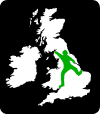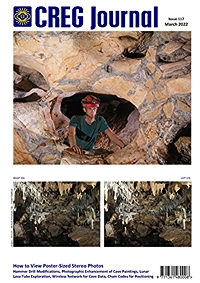
- The most recent issue to be published was 133
- For further information, please see Publishing/Despatch Schedule
- Database last updated on Sun, 25 Jan 2026 16:24:22 +0000
- Online access is currently available for all issues. Some of
the older issues are bit-map scans rather than digital copies.
journal scans.
- Online voting for CREG articles was withdrawn in June 2022. For info see
Voting for CREG articles
Contents of journal 117
March 2022
This page may take a few
seconds to load. Please wait ...
- CREG Journal 117 (0-24)
(PDF 8.5MB)
  Individual articles may be available below Individual articles may be available below
- This issue has a cover date of March 2022 and was published on 1 March 2022.
-
- Front Cover (1)
- Examples of Poster-Sized Stereo Pairs. Photos: Daniel Chailloux, Michael Perryman.
-
- Contents (2)
(PDF 528KB)

- List of contents and masthead information.
-
- News and Notes (2) For download see previous item
- Spring 2022 Field Meeting, Rob Gill.
-
- Robocrane: Supporting Lunar Lava Tube Robotic Explorers (3-5)
(PDF 1.0MB)

- Exploration of lunar lava tubes is a challenging task. One of the main problems that exploring robots will face is the lack of solar light to charge their batteries, and the lack of a direct line-of-sight to establish a communication link. As Manuel Arias, Fermín Navarro and Fernando Aguado Agelet report, Robocrane is a system that tackles both challenges by deploying a charger and a communication relay inside the pit through a skylight. The crane is also capable of deploying the exploring robots inside the pit, simplifying their design.
-
- We Hear (6)
(PDF 384KB)

- Roundup of news and events: Mike Bedford brings us the latest to impact the world of cave radio and electronics. A Dentist's Approach to Caving Projects?, Introducing the Thrunite TH30, The Internet of Underground Things.
-
- Photographic Enhancement of Cave Paintings using DStretch (7-10)
(PDF 2.1MB)

- Jon Harman introduces DStretch, his tool for enhancing photos of rock art using the technique of decorrelation stretch. He illustrates its use with examples of cave paintings from Baja California which show impressive results.
-
- Building Blocks (11)
(PDF 236KB)

- The noble art of soldering, by Tony Haigh.
-
- BuecherNet at Fort Stanton Cave, New Mexico (12-15)
(PDF 2.1MB)

- A network of wireless data transceivers is being established to transmit water and air sensor data from the Snowy River passage in Fort Stanton Cave to the surface. Lithium thionyl chloride batteries were selected for long life, though these introduced further challenges. John T. M. Lyles describes the technology, the production build and the current state of implementation.
-
- Applications of Chain Codes for Position Encoders (16-18)
(PDF 397KB)

- Linear and rotary position encoders can measure position using a single-track binary sequence known as a chain code. In a follow-up to his article in CREGJ 116, David Gibson gives some further explanation of how chain codes can be used. An online demonstration program accompanies this article at bcra.org.uk/cregj/more/j117
-
- Cyclic Binaries / Chain codes – Demo for CREGJ 117 (webpage)
- This online demonstration program by David Gibson accompanies the above article.
-
- Modifying the DH18DSL Hammer Drill for Ease-of-use in the Cave Environment (19-21)
(PDF 873KB)

- By modifying it to accept modular external batteries while retaining the ability to use the original batteries, and delivering a load-bearing, power-carrying connector, several caving benefits are on offer for this popular hammer drill. Alexander Ried provides a practical guide which also applies to several other drills.
-
- Letter to the Editor (21)
(PDF 319KB)

- Underground 'Radio' Powered by Compressed Air, David Gibson
-
- Viewing Poster-Sized Stereo Pairs (22-24,1)
(PDF 2.2MB)

- Stereoscopic pairs are traditionally viewed using a handheld 3D viewer. But when printed in a magazine or shown on a display board, such images are difficult to view unaided, as well as being necessarily very small because the centrelines of the images must match that of the eye. For stereo pairs to have an impact, they must be larger, but a traditional method of viewing larger images requires them to be printed in false colours, thus making them impossible to appreciate without special tinted glasses. In this article, David Gibson describes a simple technique that avoids this problem and allows poster-sized full-colour photos to be viewed without any artificial aid. Significantly, this allows them to be fully-appreciated both as flat images and as stereo pairs. Examples are shown on the covers of this Journal and in the online file bcra.org.uk/cregj/more/j117/3d.html..
-

|

View Contents:

BCRA is a UK registered charity and is a constituent body of
the British Caving Association,
undertaking charitable activities on behalf of the BCA.
BCRA publishes a range of periodicals and books.
Click here for further information.
|
Searching
To Search our pages using Google, type a search
string in the box at the top of the page and hit your Return key
You can also search our publications catalogue at the British Caving Library
The CREG Journal Search Engine is a new, powerful search engine which will, sometime, be extended
to cover Cave & Karst Science. We have a keyword search facility on our Cave Science Indexes pages but this may be rather out-of-date.
|
For staff use: Link to Database
Show/Hide
download figures next to each item (if available and non-zero; you might need to refresh page first). Counters last
reset on Thu 03-Jan-2019 17:29:28 +00:00. The figures are non-unique
click-throughs.
|









